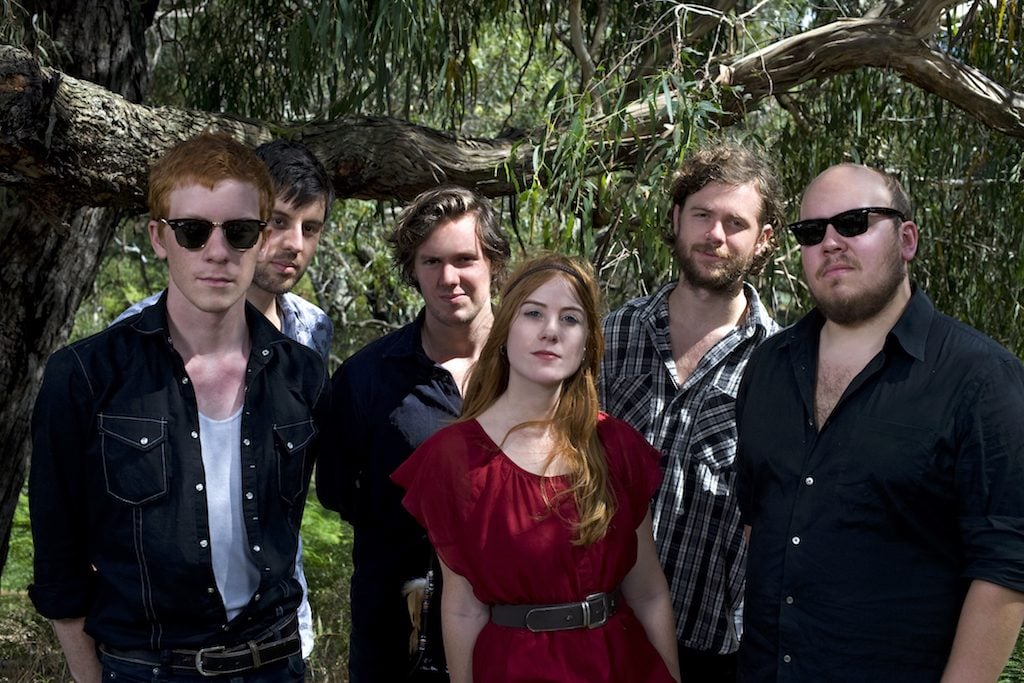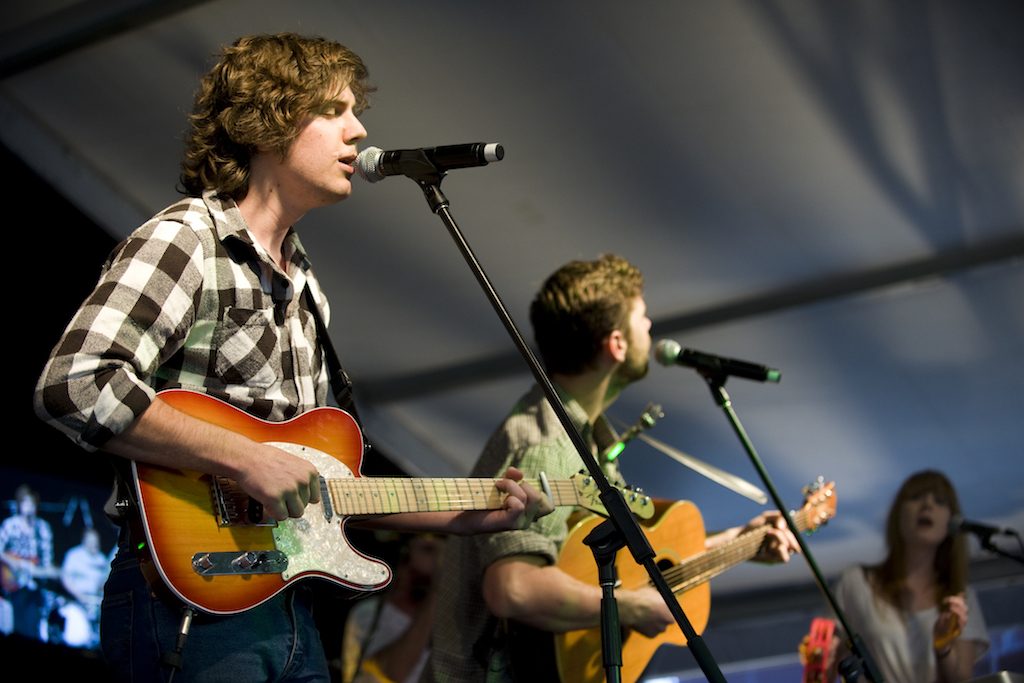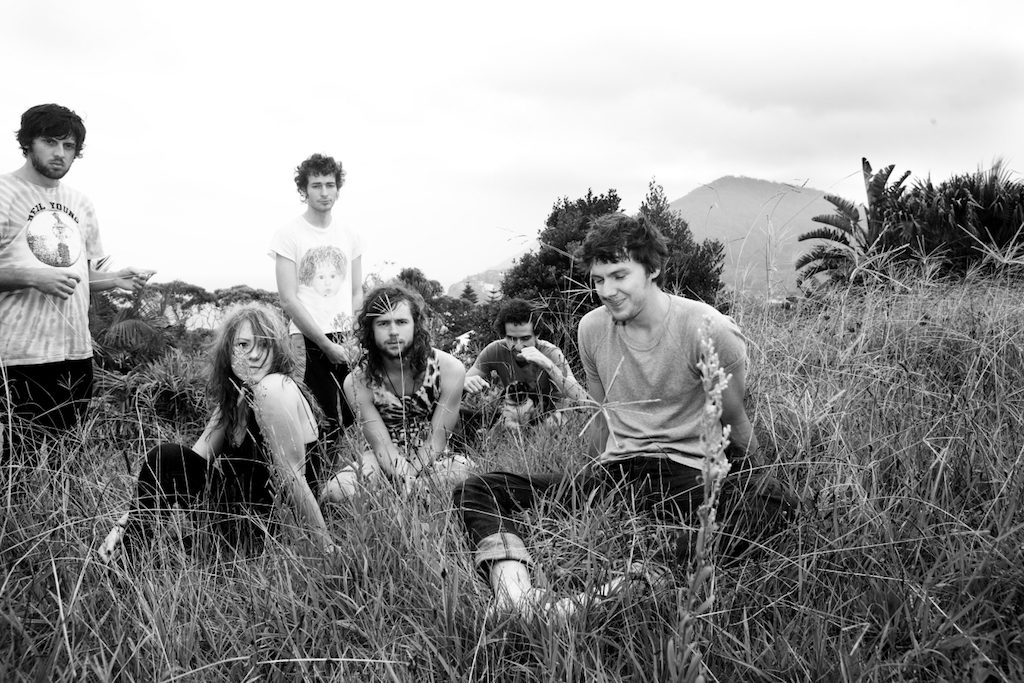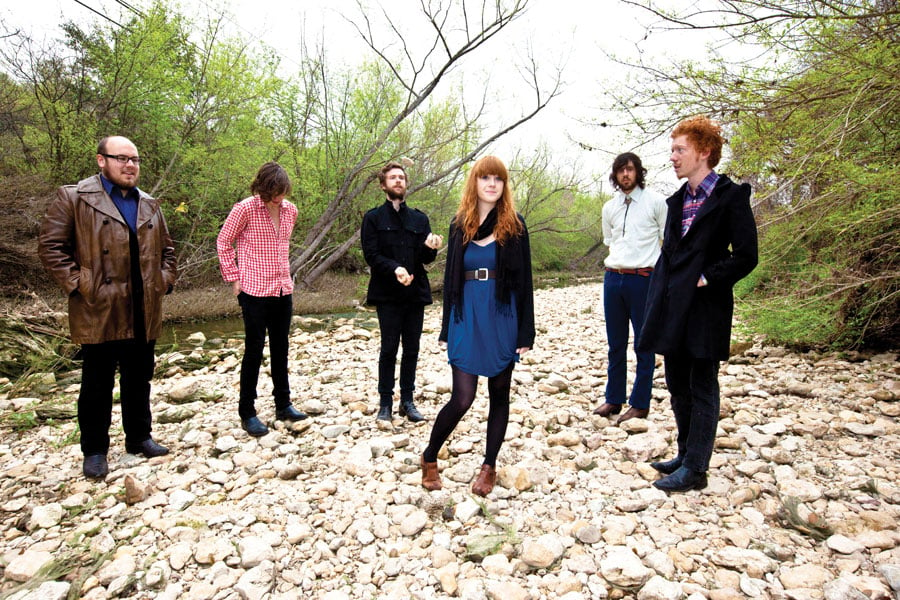TO WHOM IT MAY CONCERN:
writing to inform you that we’re ceasing. i’m not sure if we’ll make more music later on or not.
we don’t feel like playing anymore for a whole lot of reasons that i won’t list here and i’m afraid if we continued any longer it would just be a moneygrab. i’d rather go hungry. thank you to all those who came to shows.
we had fun.
t.s elliot wrote ‘you are the music while the music lasts’, but he also wrote that confusing little book about cats so don’t put too much stock in his quotes.
i’m very tired. until next time.
sincerely yours,
the middle east.
This was the statement released to the press on an August day in 2011 by Townsville 7-piece The Middle East. To the wider independent Australian music community, its timing and wording was as strange as it was unexpected, and its apparent nonchalance was derided by many as pretentious. But for fans of the band, it was merely symptomatic of The Middle East’s disarming honesty, the trait that had made their music so painfully relatable and affecting in the first place.
For many, it was also an all-too-abrupt ending to a story that was only halfway through its third chapter. 2011 was supposed to be their year. With an evening performance on the final night of Splendour in the Grass, they had a perfect crest for the wave of hype that had been building ever since the release of their slow-burning LP turned EP, The Recordings of The Middle East in 2009. This five track release had begun it all for the band after several false-starts and despite only one song coming in below five minutes in length, two polled in the triple j Hottest 100 and the maturity of the songwriting made them the tell-your-friends success of the year.
Yes, it was folk-pop, which as a genre was persona non-grata in the pop music community at the time, but their execution was more akin to Big Star and Nick Drake than the tweed vested chorus boys that were dominating the charts and radio. The obvious single was ‘Blood’, a galloping anthem that balanced its lyrical morbidity with a soaring gospel influenced coda. But it was the journeys within the songs that set their EP apart, with each track building up to its own emotional crescendo, like the blood-curdling screams over Bree Tranter’s ghostly cooing at the end of ‘Lonely’.
The Recordings of The Middle East was one of those rare introductions to a band that did not just hint at the band’s potential, it was a testament to it.
The Recordings of The Middle East was one of those rare introductions to a band that did not just hint at the band’s potential, it was a testament to it. But as their growing fan base diligently waited for the arrival of an album, stories from the band’s tour started leaking tales of dysfunction and in-fighting. It was obvious from their lyrics that the band had always carried a certain amount of emotional baggage, but as the once unnoticeable cracks became fissures, playing music together slowly became a Sisyphean boulder to keep pushing up a mountain.
It was from under this weight that I Want That You Are Always Happy was born and released in April 2011. It garnered all the attention an album of its expectation was going to, including a nod from triple j as Feature Album of the Week, ticks of approval from community radio and a respectable four star review from Rolling Stone. But no pat on the back or band-aid was going to be able to address the creative differences within the band and instead of 2011 being a year-long victory lap, The Middle East announced that their Splendour In The Grass set would be their last show together.
Until now. In one of the few gleeful moments of the godforsaken hellscape that is 2019, Spunk Records announced a mammoth 20th anniversary showcase as part of Sydney’s Vivid LIVE program, with performances by Emma Russack, The Ocean Party, Holly Throsby, Jack Ladder and Machine Translations. And as if this wasn’t enough of an indie fever dream of a show, headlining the bill would be none other than our reclusive progeny.
In the eight years that have passed since their unceremonious end, the mythology around the band has birthed a cult following, in admiration for one of few Australian ensembles that created art for art’s sake.
But during this self-induced coma, one publication has never left their bedside vigil. And a few years ago, during the days when there was but the faintest heartbeat, Music Junkee (under the gone-but-not-forgotten-banner FasterLouder) sat down with Jordan Ireland (songwriter/vocals/guitar) and Mark Myers (producer/guitar/trumpet/flute) to talk about their turbulent past, the inevitable regrets of youth, and about being one of the greatest Australian bands that never was.

From your recollection, what was the prevailing emotional state of the band during the recording process of I Want That You Are Always Happy? And did that change when the album was finally released?
Jordan: Ah man. I felt so many things, bewilderment probably sums it up best, we were an extremely confused band. All the hype and excitement surrounding our little knot of young and very naive country kids became really daunting, really quickly and I think you can really hear that in those recordings.
“It’s sort of comical how well we imploded; we were just completely not ready for it. I was pretty ego-crazed.”
Looking back now it’s sort of comical how well we imploded; we were just completely not ready for it. I was pretty ego-crazed and I think by the time we had even started recording the album we were probably already selling ourselves lies. It was a relief to have it released only in the sense that we could move on, but it’s strange hearing it now for the first time in years that I can hear things I never knew were coming out.
All of that confusion and sadness at growing up in dysfunctional religious families and all of that coming into adulthood and realising the world is sadder and messier than anything we had previously conceived. I can hear Townsville in there, a town whose primary existence is based around state-funded violence and digging up coal. Maybe in that sense it’s a good album, as it’s as perfectly confused as the place it came from. My voice still irks me though.
Were you aware of the boxes the media were trying to put you in? And was the production of the album, the way it focused more on tone than melody a conscious reaction against that and the expectations placed on the band?
Jordan: So reactionary, not in a brave way though. We were so terrified of being a cute indie band that I think we scared ourselves into a corner and died there before we could prove we were anything else. I guess these songs are mutterings from that small place.
Mark: I think we were fairly isolated in that respect. I remember multiple times driving from Brisbane back to Townsville after a tour with the feeling that we were leaving the music scene behind. In Townsville everything felt so normal, I didn’t read too much about what people were saying and of course there were no music industry people there. I think there are some strong melodies, but we did put a lot of effort into tones. I don’t think that’s a new thing for The Middle East as a band though, I don’t see the debut as a reaction to anything, but more of a natural evolution.

Was there a hint of irony in titling your debut album I Want That You Are Always Happy considering how dark the lyrics are? I remember listening to ‘Black Death 1349’ for the first time and thinking “Jeeeezus this is heavy”…
Mark: I see the title as fairly sad, maybe not morbid, but definitely melancholy. It implies that someone might not always be happy. I don’t think the themes are too much of a stretch from the EP. Apart from the triumphant ending of ‘Blood’, the song itself is about death and separation. ‘Lonely’, ‘The Darkest Side’… they’re not exactly uplifting.
Jordan: I can’t really remember how we ended up deciding on the title. It was a note on a fridge written by a friend’s two-year-old boy that (drummer) Mikey had taken a photo of. I was angling for ‘Pig Flowers’ as the title, but understandably I don’t think it really struck a chord with the others. So much of what we did was out of circumstance or necessity, so I think we probably just needed a title.
But then again, looking back on it, the words ‘I Want That You Are Always Happy’ seems to make sense now, lending itself to that thing of saying goodbye to adolescence, or a child saying goodbye to that part of themselves that continues on into the big bad world.
What was your own personal relationship to ‘Blood’ by the time you were recording the album? I remember seeing you play at The Corner Hotel in Melbourne and you announced to the crowd that you weren’t going to play it because a drunken buffoon had shouted for you to play it too many times during the set. Did the song do more harm than good in your eyes?
Mark: I remember that show too. I was happy to play the song, I didn’t write it though and I know how playing a song over and over again can be. We took a break from playing it for a while and I think it was a good thing, but you have to know what was going on there, we didn’t not play ‘Blood’ that night because some guy was hassling us. Rohin conveniently and hilariously used it as an excuse, but we hadn’t played it at most of the shows and were never planning on playing it that night. I also remember loading our gear after the show and these two girls walked past and said it was great that we didn’t play ‘Blood’.
“It’s fine to write an annoying song, but to abandon your true self to help sell a product is pretty deluded and uninspiring.”
Jordan: It’s a strange song. It was so heartfelt and sentimental when it was written and it was the only reason we ever really got heard outside Townsville — only for it to become this thing we were semi-embarrassed about. Not to mention how much we absolutely prostituted it out to advertisements and Hollywood. I think that’s the sad part: that we cashed in on it. It’s fine to write an annoying song, but to abandon your true self to help sell a product is pretty deluded and uninspiring.
Another big factor in us breaking up was the royalty side of things, so when there was money coming in things got pretty classically ugly. I was pretty full of my own shit at that point and must have thought I was some sort of genius.
What are your feelings towards the album now? Are you proud of it or are the emotions more complicated than just pride?
Jordan: Pride isn’t something I’d say I feel about it, but I do feel at peace with it. It happened. That’s where we were at, that’s the place we were in and I feel a lot of nostalgia about it. We were touring the United States for a lot of it and then Europe afterwards, as well as a lot of moving around Australia so there were some great times and some terrible times. The only real aspect I’d associate with pride in regards to the band would be how we’re still really good friends after all these years. It definitely could have gone the other way there for a while. If there’s any artistic merit in there on another level, I’m probably too close to hear it.
Mark: I had a listen to it about a year ago and my girlfriend plays it a bit. I’m proud of it, but I do hear a few things that I would have done differently if I’d mixed it now. But overall I think it’s aged well and I enjoy the trip down memory lane.

How was (record label) Spunk’s reaction when they first heard it? Were they surprised by its darkness and density? Even the track listing seems unconventional, burying what was an obvious single in ‘Hunger Song’ as track 11…
Mark: You’d have to ask Aaron what he thought. ‘Hunger Song’ was more popular in Europe; I don’t know if it’s the obvious single, is it? I’m not sure how much Jordan liked it after we recorded it…
Jordan: Yeah I have no idea what Aaron thought. He was always pretty cagey with that stuff and he left us alone for most of it. I don’t know what he was expecting either. On the other hand, our management company in America were always pushing us to play the game and were pretty obviously not that into it. I think they knew they wouldn’t make any money out of it and there was a slight satisfaction in that.
Well I understand that, listening to a song like ‘Mount Morgan’, it’s more of a dirge than a song that would normally be found on a pop record. How much discussion during the writing and recording process was there regarding the debut’s direction? Was there any specific reason the amount of Bree’s vocal duties were so diminished? I thought she was a main vocalist until the album was released and her voice is barely heard save for one or two tracks.
Jordan: Yeah I can’t believe that too. I don’t know why Bree isn’t in there more. I only realised just now listening to it after you pointed it out. It saddens me. I don’t remember that being a conscious decision at all; there was a much less cohesive effort on behalf of Rohin and myself in regards to writing the songs.
On the old stuff we wrote everything together and always gave Bree parts to sing, but this time everything was very separate. I think I was already wanting to go solo by that point and Bree just got lost in the middle somewhere. We also left out a number of songs that we’d recorded with her singing. I regret that.
We were really worn out and depressed, playing this tour and supporting a band whose music and we really didn’t like and subsequently it made us feel like sell outs.
As far as direction goes, we had none. We all had our own ideas and no shortage of inspiration, but no collective goal. A few of us disagreed most of the time over parts or structure and we were overseas trying to fit in what recording we could between playing shows all over the country. We were really worn out and depressed, playing this tour and supporting a band whose music and we really didn’t like and subsequently it made us feel like sell outs.
We were arguing, most of us were drunk and stoned a lot of the time, except for Mark who stayed pretty sane and sober to drive us around and press the record button. Mainly I think we felt immense pressure to put out an album and for it to be really good so we could capitalise on all the hype that had somehow cast its unholy gaze our way.
A friend in Denton, Texas where we’d set up to record for a few weeks had a motorbike. He used to come around after work with a joint and some beer and pick up whoever wasn’t tracking at the time and go ride around these lakes out of town. I remember feeling that wind in my face and realising for the first time that we were getting it all wrong. Instead of being ourselves and making sure the music was fun and beautiful and playing house shows for friends with bands we liked and recording whenever the hell we wanted, we were doing everything the opposite way.
We had been completely sucked up by our own egos into this huge evil machine, just to be dollar signs. All I knew is what I didn’t want the album to sound like, which was what we had previously sounded like. In essence we were splitting ourselves in two, the whole thing was very paranoid and borderline schizophrenic and I think that’s how it turned out. Sorry, that was a rant, wasn’t it…
What song are you most proud of from the album? I personally love ‘Land Of The Bloody Unknown’ and ‘Very Many’ and I have always thought the sheer scale of ‘Deep Water’ was never given the praise or attention it deserved.
Mark: ‘As I Go To See Janey’ is a favourite; I think it’s real pretty and sad. I also think it’s funny that a guy with a lisp chose to sing the line “six Spanish sailors”. But ‘Deep Water’ just happened so effortlessly, Rohin just had it all worked out and it’s such an easy listen considering the length of the track.
Jordan: Listening back to it now, I agree, Rohin’s, ‘Very Many’ strikes a chord, I never realised how spooky those strings sounded. And I agree with Mark, ‘As I Go To See Janey’ is nice too. I really can’t abide ‘Black Death’ though; I don’t know what I was on about there. Escapism? I have no idea. I guess I had a bit of a knack for wrecking my nice chord progressions by singing over them.

Do you feel that the timing of the band’s break up over-shadowed the legacy or reception of the album? And was it a matter of cause and effect or had the road towards disbanding begun before the album was released?
Jordan: Definitely that crack had appeared long before. Probably the moment we started getting played on triple j…
Mark: We knew about the break up since the start of 2011 or maybe the end of 2010. I don’t think it had anything to do with the album, The Middle East was a fairly unstable band in some respects and I reckon the road to disbanding began around the time the band got together.
Have you ever felt a lack of closure from not having played a full touring cycle to see how the songs from I Want That You Are Always Happy transformed live?
Mark: I prefer the studio to the stage and I’d say a few of the other members feel the same way, so the thought of a full tour cycle probably didn’t seem like loads of fun. I think the songs could have become something different; we played ‘Black Death 1349’ a lot rockier live and I remember the first show in Sydney (third last show of the tour), we changed the set list around and something great happened. But I also wonder if everyone would have just got sick of playing live and I guess it’s hard to say because we all knew it was about to end and I think that made the tour a lot more fun.
Jordan: Maybe we’ll get around to touring it in another five years and start playing some open mic nights. Less cheese platters, more Tooheys Old on tap…
The Middle East will perform as part of a Spunk Records showcase at Vivid LIVE this weekend — for all dates and details, head here.
Chris Lewis is a writer and critic based in Melbourne. He is on Twitter.



